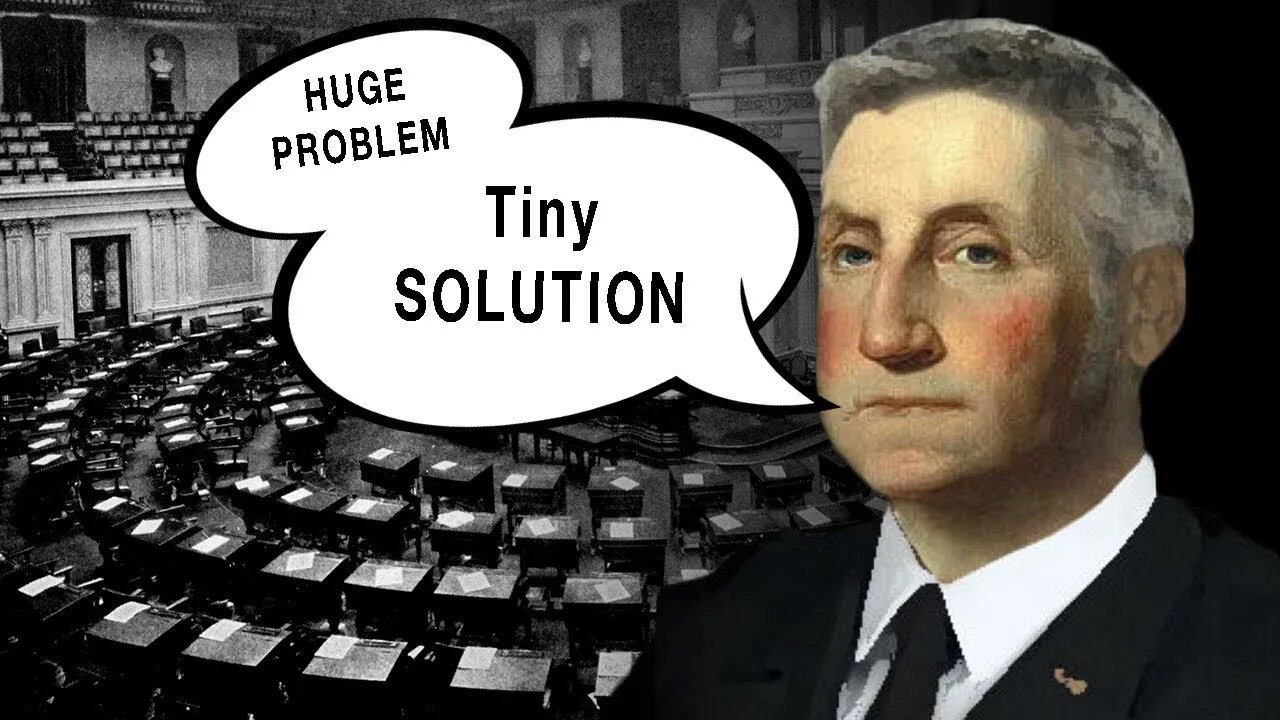Premium Only Content

The Enormous Political Problem Facing America in the Future
One of the big problems looming on the horizon is that a smaller and smaller portion of the American population will have more and more power.
This is because of how our U.S. constitution was designed.
In 1789, there was a compromise between big states and small states known as the “Connecticut Compromise” where the U.S. legislative branch would consist of a bicameral legislature: House of Representatives and Senate.
The House of Representatives appealed to big states because since congressional seats would be proportionally allocated this meant more populated states would get more congressmen whereas the Senate appealed to small states because every state regardless of size would get two senators.
This worked for the United States of America when power was largely decentralized to the states and where in 1790 the smallest state Delaware had 60,000 people and the biggest state Virginia was just 12 times bigger with 692,000 people.
But now the smallest state Wyoming has 600,000 people and the biggest state California is 66 times bigger with 40 million people.
This population inequality will only grow.
People are being pushed into cities, specifically big cities in big states.
How will American politics change when 90% of the U.S. population lives in 3 - 5 states?
This will give an enormous amount of power to the less populated rural states, i.e. countryfolk and rich businessmen!
(political problem facing the united states of america in the future, what is the biggest problem facing america, political problem facing the united states of america, problem facing the united states of america, end of democracy in america)
We already see this play out in the U.S. Senate where the Senate Majority Leader Mitch McConnell from Kentucky is an interesting mix of anti-government, except when it benefits big business, big agriculture, and the military-industrial complex.
The only way to change the U.S. constitution is with a constitutional amendment, which requires two-thirds support in the House of Representatives, U.S. Senate, and state legislatures, in other words since the small states will never vote to give up their power there’s virtually no political solution to this looming problem.
On the plus side, I’m a federalist, constitutionalist, small-government conservative so I like the idea that the U.S. Senate will be able to keep our more socialist impulses in check.
But population inequality taken to the extreme will create an undemocratic America, which should alarm any good American whose a lowercase republican and democrat.
Now although there’s no political solution, there is a demographic one!
I’ve written about this many times, but I believe the U.S. government should increase taxes on large estates (to discourage the hoarding of land as a financial instrument) and then to use the proceeds to contract the building of thousands of tiny houses per year.
You could then buy a tiny house ranging from $10,000 to $30,000 via a low-interest loan. This would drive down the cost of rent and eliminate homelessness in the United States (I could extrapolate on this point in the comments if you’d like). The expensive part of owning a home is the land it sits on. With your home, you could then move it to any tiny house community in the country where you’d then just have to pay a small community fee.
(political problem facing the united states of america in the future, what is the biggest problem facing america, political problem facing the united states of america, problem facing the united states of america, end of democracy in america)
One of the counter-points to my Tiny House proposal is that building skyscrapers in big cities is a more economical use of resources, which may be true, but some people such as myself prefer the sound of birds and the rustling of leaves.
With more electric automated vehicles, people working from home, and a 21st infrastructure, Americans could also afford to live further away from the office.
And in so doing, save our democratic republic.
-
 6:33
6:33
Anthony Galli
1 year agoHow Socialism Runs American “Capitalism”
38 -
 LIVE
LIVE
Akademiks
57 minutes agoWar in RAT-LANTA. Young Thug vs Gunna vs Ralo vs YSL MONDO. Who Will Le Bebe Pick. FINAL CRASHOUT!
1,779 watching -
 59:29
59:29
The Charlie Kirk Show
1 hour agoTHOUGHTCRIME Ep. 96 — The Great Flag Burning Debate
5.47K6 -
 LIVE
LIVE
The Mel K Show
1 hour agoMel K & General Mike Flynn | Betrayal of a Nation: Soros’ NATO World Order | 8-28-25
1,129 watching -
 1:32
1:32
Gaming on Rumble
8 hours agoWhat is the Rumble Creator Program?!?! | Lvl UP
903 -
 LIVE
LIVE
Joker Effect
22 minutes agoInterviewing BEN JAMMINS! A personality with over 1 BILLION gif views. Let's give him a warm welcome
404 watching -
 11:37
11:37
Robbi On The Record
6 hours agoThe Devil is in the Branding..
604 -
 LIVE
LIVE
Savanah Hernandez
2 hours agoWhy Gen-Z Is So Radicalized Against Immigration
230 watching -
 LIVE
LIVE
megimu32
1 hour agoOTS: From A-List to MIA! 90s & 2000s Stars Who Vanished
121 watching -
 LIVE
LIVE
TinyPandaface
1 hour agoYour FACE Is A Gaming Channel! | Super Smash Bros w/ THE FELLAS!
69 watching